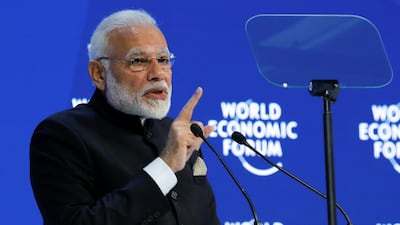India’s prime minister Narendra Modi has warned against turning away from globalisation during his opening keynote address at the World Economic Forum (WEF) 2018 in Davos, Switzerland.
Hindu nationalist Mr Modi, who gave the speech in Hindi, is the first Indian Prime Minister to visit the WEF in 20 years.
Mr Modi said that globalisation was “losing its lustre” and cited institutions set up in aftermath of the Second World War such as the United Nations as being partly responsible.
“Everyone is talking about an interconnected world but we will have to accept the fact that globalisation is slowly losing its lustre,” he said.
_______________
Read more:
Davos 2018: UAE's long-term vision a model for success in uncertain world
Davos prepares to welcome world leaders - in pictures
_______________
Without naming any country, Mr Modi said a recent wave of trade protectionism was threatening free trade among nations.
“Forces of protectionism are raising their heads against globalisation,” he said. “They want to reverse its flow.”
He later quoted Mahatma Gandhi, saying: "I don't want the windows of my house to be closed from all directions. I want the winds of cultures of all countries to enter my house with aplomb and go out also."
Mr Modi’s words come just hours after the US approved tariffs on imported solar panels and large washing machines, designed to protect US manufacturers from foreign competition.
US President Donald Trump, who is due to speak at the WEF on Friday, has preached an “America First” ideology since taking office last year.
Mr Modi, who brought with him a huge delegation from India, said the world’s economy must be more inclusive, asking rhetorically: “How can we realise the dream of a beautiful shared future?”
He called on the biggest global players to not allow “competitiveness” to stop cooperation in what appeared to be an indirect reference to US protectionism.
“It is necessary that the big powers of the world have cooperative relations among them,” he told delegates. “It is necessary that the sense of competitiveness does not become a wall before them.”
He said protectionism, isolationism and populism were threatening the poorest in the world.
Mr Modi identified two additional threats to the world now; terrorism and climate change.
On the issue of terror, he told the packed-out crowd, which included senior politicians and celebrities, that educated, well-off young people were being radicalised.
“Terrorism is dangerous but equally dangerous is the artificial distinction created between ‘good’ and ‘bad’ terrorists,” he warned.
While on climate change, Mr Modi said more developed countries must do more to help poorer nations tackle its effects.
“Everyone talks about reducing carbon emissions but there are very few countries who back their words to help developing countries with their technology,” he said.
“To save the environment, my government has given itself a very ambitious objective, in 2022 we want to produce 175 gigawatts of renewable energy.”
Aside from global relations, Modi used the address to encourage greater investment in India, adding that his government had taken away hundreds of laws and regulations to that end.
“India is removing the red tape and laying out the red carpet,” he quipped.
Comparing the last time an Indian prime minister attended the WEF, Mr Modi said India’s Gross Domestic Product was now six times the amount it was in 1997.
By 2025, Mr Modi said India would be a $5 trillion economy.
However, today India remains a country with one of the sharpest divides between rich and poor, despite its fast-growing economy.
As Mr Modi completed his speech, Indian Congress leader Rahul Gandhi took to Twitter to suggest he should speak about the rising inequality in his country, attaching a report which said that the richest one per cent in India own 73 per cent of the wealth generated.
On Monday, international charity Oxfam released the findings of a report, which revealed that the world's richest one percent raked in 82 percent of the wealth created last year.
While president of the International Monetary Fund (IMF) Christine Lagarde, who was presenting a positive forecast for the world economy, said too many people were being left behind as the elite benefited from the economic upturn since the financial crisis ten years ago.
"We certainly should feel encouraged, but we should not feel satisfied," Ms Lagarde said on Monday.
"There are still too many people left out from the recovery and acceleration of growth," she said.


